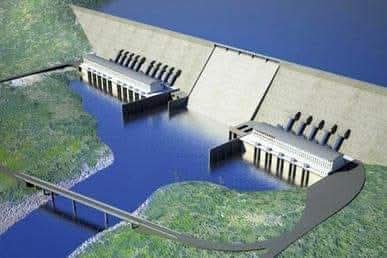Prophecy reveals God’s plans for nations and His sovereignty over the course of human history, often unveiling His purposes through events. With this perspective in mind, let us examine Isaiah 19 and Ezekiel 29 in light of the Great Ethiopian Renaissance Dam (GERD) on the Nile and its potential role in the fulfillment of prophecy.
Isaiah 19 and the GERD: Egypt’s Water Crisis and God’s Sovereignty
Isaiah 19 addresses Egypt’s relationship with the Nile River, its economy, and God’s ultimate plan for the nations.
Key Connections to the GERD:
- The Drying of the Nile (Isaiah 19:5-10):
The prophecy states:
“The waters of the river will dry up, and the riverbed will be parched and dry. The canals will stink; the streams of Egypt will dwindle and dry up.”
The Nile has been the lifeblood of Egypt for millennia, and its predicted drying could symbolize disruptions to Egypt’s access to the river. The GERD, as a massive hydroelectric project, has introduced the possibility of altering the flow of the Nile and reducing Egypt’s water supply, particularly during critical filling periods.
While the prophecy may not necessarily refer to literal desiccation, the symbolic drying up represents a judgment on Egypt’s reliance on the Nile as its source of power and sustenance.
- Egyptian Despair and Leadership Failure (Isaiah 19:11-15):
The passage describes Egypt’s leaders as foolish and unable to provide solutions:
“The officials of Zoan are nothing but fools; the wise counselors of Pharaoh give senseless advice.”
This echoes the current situation, where Egypt’s leadership struggles in negotiations over the GERD. Despite international mediation efforts, Egypt has not yet achieved its desired outcomes, leading to frustration and political tension.
This could fulfill the prophecy of Egypt being confounded, as its dependence on the Nile is challenged by Ethiopia’s rise as a regional power.
- God’s Judgment and Redemption (Isaiah 19:16-25):
The prophecy transitions from judgment to redemption, describing a future where Egypt, Assyria (symbolizing the broader region), and Israel are united in worship of the true God.
Ethiopia’s rising prominence through the GERD could be viewed as part of God’s redemptive plan. By reshaping the Nile’s dynamics, Ethiopia might be playing a role in the larger divine narrative, ultimately pointing all nations toward reliance on God rather than earthly resources.

Ezekiel 29 and the GERD: Egypt’s Humbling and Ethiopia’s Rise
Ezekiel 29 prophesies judgment on Egypt, particularly its arrogance and reliance on the Nile River.
Key Connections to the GERD:
- Egypt’s Pride in the Nile (Ezekiel 29:3):
The prophecy declares:
“This is what the Sovereign Lord says: ‘I am against you, Pharaoh king of Egypt, you great monster lying among your streams. You say, ‘The Nile belongs to me; I made it for myself.’”
Egypt’s historical dominance over the Nile and its perception of the river as its exclusive right aligns with this depiction of Pharaoh’s arrogance. The GERD challenges this narrative, as Ethiopia asserts its own right to use the Nile for development.
The prophecy highlights that the Nile is not Egypt’s possession but God’s creation, and any attempt to control it apart from God’s will invites judgment.
- Desolation of Egypt (Ezekiel 29:8-12):
The Lord warns:
“Therefore, I am against you and your streams, and I will make the land of Egypt a ruin and a desolate waste.”
While this desolation may not be literal, it symbolizes Egypt’s economic and political decline. The GERD could contribute to this humbling by diminishing Egypt’s traditional reliance on the Nile and forcing it to adapt to new realities.
This judgment serves as a reminder that nations cannot depend solely on natural resources or human power but must acknowledge God’s sovereignty.
- Restoration as a Lowly Kingdom (Ezekiel 29:13-16):
After 40 years of judgment, Egypt is restored but no longer as a dominant power:
“Egypt will become a lowly kingdom. It will be the lowliest of kingdoms and will never again exalt itself above the other nations.”
This humbling aligns with Ethiopia’s growing influence in the Nile Basin through the GERD. By building the dam, Ethiopia shifts the regional balance of power, reducing Egypt’s dominance.
This restoration highlights God’s mercy and His desire for all nations to turn to Him, even after judgment.
The GERD as a Fulfillment of Prophecy
From a prophetic perspective, the GERD can be seen as a significant event in God’s unfolding plan for the nations of the Nile Basin:
- A Symbol of Ethiopia’s Role in God’s Plan:
Ethiopia, often identified with “Cush” in the Bible, plays a unique role in prophecy. Isaiah 18 refers to a “land beyond the rivers of Cush” sending envoys, which could point to Ethiopia’s growing global significance. The GERD, as the largest dam in Africa, has drawn international attention to Ethiopia and may symbolize the fulfillment of this prophecy.
- Judgment on Egypt’s Dependence on the Nile:
Both Isaiah 19 and Ezekiel 29 highlight the consequences of relying on natural resources without acknowledging God. The GERD’s impact on Nile flow could be part of God’s judgment on Egypt, forcing it to rethink its dependence on the river and its geopolitical dominance.
- A Pathway to Reconciliation:
Isaiah 19 concludes with a vision of peace among Egypt, Assyria, and Israel, symbolizing unity under God. The GERD, while currently a source of tension, has the potential to promote regional cooperation and shared prosperity, fulfilling this prophetic vision of reconciliation and mutual blessing.
Conclusion
The Great Ethiopian Renaissance Dam could be seen as part of the fulfillment of biblical prophecies in Isaiah 19 and Ezekiel 29, reflecting God’s sovereignty over nations and His plans for judgment, redemption, and reconciliation. It challenges Egypt’s reliance on the Nile, elevates Ethiopia’s role in the region, and serves as a reminder that all nations are ultimately subject to God’s will. While the current disputes may appear divisive, they point to a larger divine purpose that aligns with the biblical vision of nations acknowledging God and living in unity under His rule.


